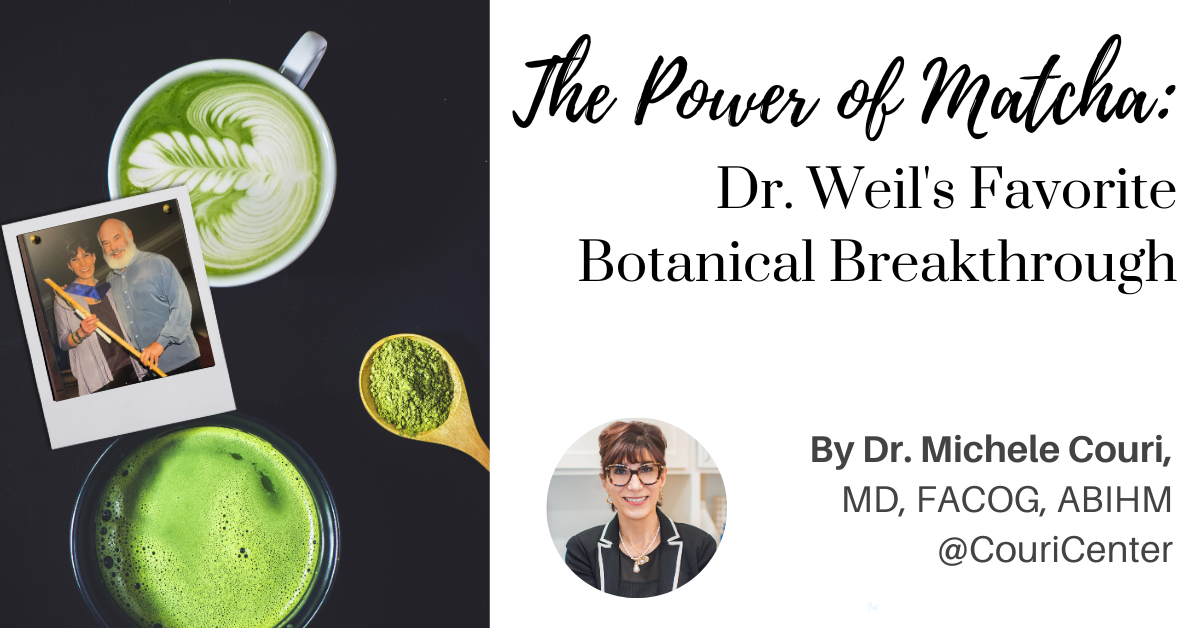
Summary
Unravel the nutritional powerhouse of matcha, renowned for its antioxidant-rich profile and myriad health benefits, including neuroprotection and anti-cancer properties. Join Dr. Michele Couri as she shares insights from her mentor, Dr. Andrew Weil, on a journey through the world of matcha, exploring its origins, therapeutic qualities, and practical tips for integrating this ancient elixir into your daily wellness routine.
Over the years, I have had the privilege of having some amazing mentors who have taught me both the art and science of medicine. One of them, in particular, is Dr. Andrew Weil, an internationally recognized expert on medicinal plants, integrative medicine, and wellness. As the founder and Director of the University of Arizona Center for Integrative Medicine, Dr. Weil is leading the global effort to develop a comprehensive integrative medicine curriculum. In fact, I was fortunate enough to be one of Dr. Weil’s students of Integrative Medicine, completing my Integrative Medicine Fellowship under his direction in 2011.
Dr. Weil’s knowledge of plant-based therapies is impressive. He has taught me a treasury of information about herbal therapies and food as medicine. One of his favorite products is matcha green tea because of its multitude of health benefits. In fact, Dr. Weil is one of the founders of my favorite matcha green tea company, Matcha.com. Matcha is Dr. Weil’s latest botanically-based ‘alternative’ medicine. With an A.B. degree in botany from Harvard in 1964 and an M.D. from Harvard Medical School in 1968, Dr. Weil has traveled the world collecting information about medicinal plants and alternative methods of treating disease.
What exactly is matcha? Matcha is a powdered type of Japanese green tea. It has a distinct growing process in which the tea bushes are covered using bamboo mats to shade the leaves from excessive sunlight. Because of this process, the plants are able to produce higher levels of chlorophyll and theanine, giving the tea its distinctively non-bitter taste and its vibrant green color.
The following facts about matcha green tea make it a nutritional powerhouse and make it one of my favorite “food as medicine” recommendations.
- Matcha tea is rich in polyphenols which are powerful antioxidants. Examples of some of these polyphenols in matcha tea include EGCG, caffeine, rutin, quercetin, vitamin C, chlorophyll, and theanine. Many of you may know that theanine is one of my favorite substances because of its ability to help us modulate stress and improve focus. It is also very calming so it helps to negate the stimulating effect of the caffeine in matcha. Also, research has shown that when quercetin is combined with EGCG, the anti-cancer properties are enhanced. Nature has truly thought of everything.
- Matcha tea also provides trace minerals and Vitamins A, B-complex, C, D, and K.
- The powerful polyphenols in matcha tea collectively give it its medicinal qualities:
- Neuroprotective – improves cognitive function, reduces stress, improves memory, reduces neuroinflammation, promotes mental clarity, reduces anxiety
- Regulates insulin secretion – improves insulin sensitivity, stabilizes blood sugar, lowers lipid absorption to improve cholesterol levels, reduces LDL and triglycerides, increases HDL, reduces the release of inflammatory cytokines
- Cardioprotective – lowers cholesterol levels, strengthens blood vessels
- Liver protective – improves detoxification
- Anti-cancer effects – boosts immunity, inhibits tumor blood vessel formation (angiogenesis), reduces inflammation, inhibits tumor growth factors
Similar to dietary supplements, the quality of matcha green tea matters. Like you, Dr. Weil is equally picky about what he’s putting in his body. It took years for matcha.com to create their matcha-growing collective in Japan to develop what their customers often call “the purest and most potent matcha on the planet!” I don’t have any financial relationship with Matcha.com, but I do believe in its purity and quality. Plus, it is absolutely delicious. Simply put about a teaspoon of matcha tea into a bowl with ⅓ of a cup of hot water. Whisk with a bamboo whisk and enjoy.
However, buyers beware as it pertains to matcha. Many of you may be familiar with matcha drinks from well-known coffee chains. It has been found that in many of the popular coffee establishments, the matcha they use isn’t even 100% pure Japanese matcha. They often use a powdered mix of at least 51% pure added sugar, with some ground green tea added to it. That means that the majority of the product is sugar. To be considered true matcha, there should be no added sugar.
In conclusion, with its vibrant green hue and earthy flavor, matcha tea not only provides a delightful sensory experience but also serves as a wholesome elixir for overall well-being. Enjoy it in good health.
To your health,
Dr. Couri
DISCLAIMER: THE INFORMATION PROVIDED ON THIS WEBSITE IS INTENDED FOR GENERAL INFORMATIONAL PURPOSES ONLY AND IS NOT INTENDED TO BE A SUBSTITUTE FOR PROFESSIONAL MEDICAL ADVICE, DIAGNOSIS, OR TREATMENT. THE INFORMATION PROVIDED IS CURRENT AS OF THE DATE OF PUBLICATION OR LAST REVIEW, BUT MEDICAL KNOWLEDGE IS CONSTANTLY EVOLVING, AND THE INFORMATION MAY BECOME OUTDATED OVER TIME.
Sources Used:
Kochman, J et al. Health Benefits and Chemical Composition of Matcha Green Tea: A Review. Molecules. 2021. 26, 85.
Sokary, S et al. The Therapeutic Potential of Matcha Tea: a Critical Review on Human and Animal Studies. Curr Res Food Science. 2022 Nov 23:6.
Matcha.com and Dr. Weil.com
